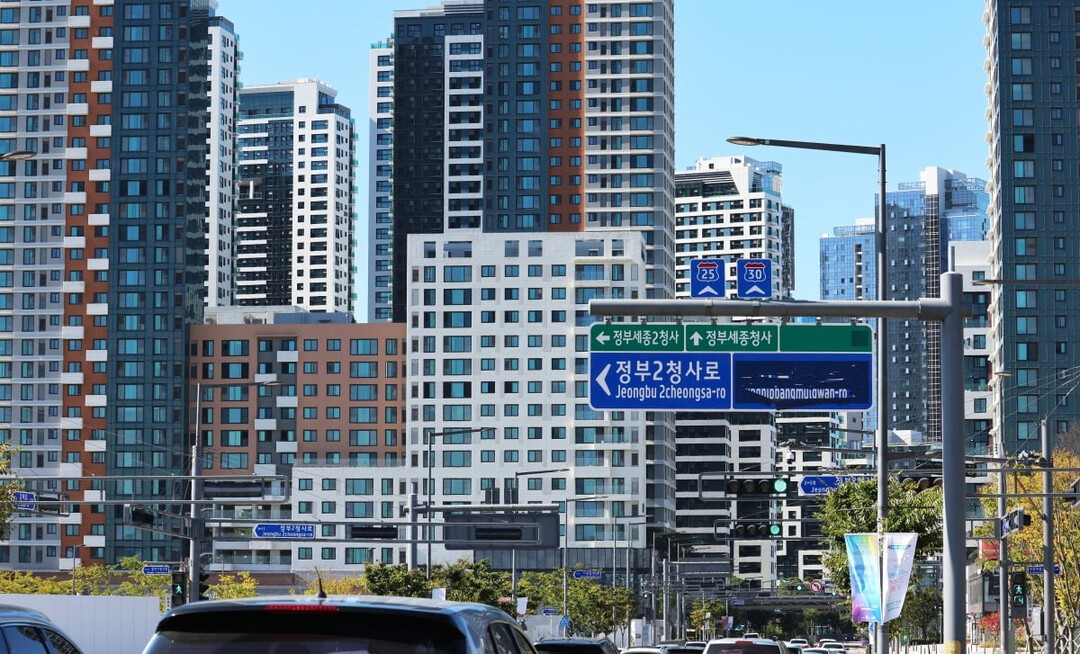
Sejong City's real estate market has shown a surprising turnaround, with apartment prices rising for the first time in over a year, fueled by speculation surrounding the potential relocation of the presidential office from Seoul following the June 3rd presidential election. This development contrasts with the broader national trend of declining apartment values, as revealed in the latest weekly survey by the Korea Real Estate Board (KREB).
According to the KREB report released today, the national average apartment sale price dipped by 0.01% in the second week of April (ending April 14th), marking the fourth consecutive week of decline. This overall downturn reflects a cooling housing market influenced by factors such as interest rate pressures and economic uncertainty. However, bucking this trend were Seoul, Sejong, and Ulsan, which recorded increases of 0.08%, 0.04%, and 0.02% respectively.
Sejong City's resurgence is particularly noteworthy. The planned administrative capital had been grappling with a consistent downward trajectory in apartment prices throughout the year, with a significant 0.08% drop just the week before. The 0.04% increase in the latest survey marks the city's first weekly gain in 2025 and the first monthly increase in 17 months since November 2023.
Analysts at the Korea Real Estate Board attribute this sudden upswing to renewed interest in the city's real estate market, particularly in key residential areas like Dajeong-dong and Saerom-dong. These districts, known for their modern apartment complexes and convenient amenities, have reportedly seen increased buyer activity and price appreciation. The speculation surrounding the potential presidential office relocation is widely considered the primary catalyst for this shift in sentiment.
The debate over relocating the presidential office to Sejong has been ongoing for years, stemming from the initial vision of Sejong as a multi-functional administrative city designed to alleviate the concentration of power and population in Seoul. While previous attempts faced political hurdles and logistical challenges, the upcoming presidential election has reignited discussions about fulfilling this long-term goal.
Proponents of the relocation argue that it would promote balanced regional development, enhance administrative efficiency by centralizing government functions, and further establish Sejong as the nation's administrative hub. The anticipation of increased government presence and potential infrastructure development associated with the presidential office could be attracting investors and homebuyers to the Sejong market.
Meanwhile, Seoul's apartment market continues to demonstrate resilience, with a steady 0.08% increase in the second week of April, maintaining its upward momentum. Despite the overall national cooling, Seoul's strong demand, driven by its robust economy, high concentration of jobs, and limited housing supply, continues to support price growth in many of its districts. However, Jungnang-gu in northeastern Seoul experienced a minor setback, with prices falling by 0.02%, a shift from a flat performance the previous week. This localized decline could be attributed to specific neighborhood dynamics or market adjustments within the district.
The Gyeonggi Province and Incheon metropolitan area, which surround Seoul, both saw slight decreases of 0.01% in apartment prices. This suggests that while the core of Seoul remains strong, the surrounding regions are more susceptible to the broader market cooling trends. However, within Gyeonggi, the city of Gwacheon stood out with a significant increase of 0.35%, accelerating from a 0.19% rise the previous week. Gwacheon's prime location, affluent residential environment, and proximity to Seoul's Gangnam business district often make it a sought-after market, potentially explaining its strong performance.
The non-metropolitan regions of South Korea continued their downward trend, with a 0.04% decrease in apartment prices. This persistent decline highlights the regional disparities in the housing market, with provincial areas often facing challenges related to population decline, lower economic growth, and weaker demand compared to the capital region and major metropolitan cities.
The contrasting trends observed in Sejong and the rest of the nation underscore the significant impact that policy discussions and potential government actions can have on local real estate markets. As the June 3rd presidential election approaches, further developments regarding the presidential office relocation plans are likely to keep a close watch on Sejong's housing market and potentially influence broader market sentiment. The resilience of Seoul's market, despite the national downturn, also highlights its enduring appeal and strong underlying fundamentals. Market analysts will be keenly observing these regional dynamics in the weeks leading up to and following the election.
[Copyright (c) Global Economic Times. All Rights Reserved.]




























